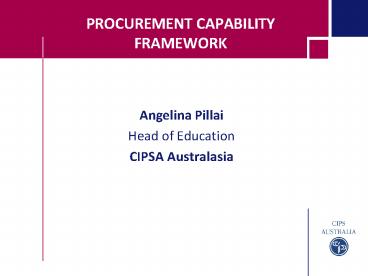PROCUREMENT CAPABILITY FRAMEWORK - PowerPoint PPT Presentation
1 / 24
Title:
PROCUREMENT CAPABILITY FRAMEWORK
Description:
PROCUREMENT CAPABILITY FRAMEWORK Angelina Pillai Head of Education CIPSA Australasia * * * * * * The Chartered Institute of Purchasing & Supply [CIPS] Incorporated by ... – PowerPoint PPT presentation
Number of Views:158
Avg rating:3.0/5.0
Title: PROCUREMENT CAPABILITY FRAMEWORK
1
PROCUREMENT CAPABILITY FRAMEWORK
- Angelina Pillai
- Head of Education
- CIPSA Australasia
2
The Chartered Institute of Purchasing Supply
CIPS
- Incorporated by ROYAL CHARTER in UK
- Not-for-profit ethos
- Must act in the public good
- Must act on behalf of the Profession
- Governed by council of 47 elected full members
- 63,000 members in 150 countries
- Peak international procurement body
- MCIPS standard
- Exams available in 72 countries worldwide
- Global markets need global buyers
3
The Professional Agenda 2010
- Professionalising procurement
- Developing procurement led solutions
- Ensuring socially responsible procurement
- Balancing risk and total cost
- Improving the organisational interface
5 issues and 25 individual topics
4
The Professional Agenda 2010
5
The Professional Agenda 2010
- Professionalising procurement
- Implementing standards people process
- Developing procurement led solutions
- Responding to policy changes buy local
- Ensuring socially responsible procurement
- Minimising internal demand driving cutbacks
- Balancing risk and total cost
- Coping with macro-economic impacts GFC
- Improving the organisational interface
- Ensuring procurement fit better process
5 issues with 5 priorities?
6
THE PROFESSIONAL STANDARDNational Occupational
Standards of SCM
- Employers and Businesses
- Business Planning
- Staff Development
- Developing and Evaluating Training
- Benchmarking
- Employees and Individuals
- Self Assessment
- Professional and Career development
- Job Satisfaction
- Motivation to learn
7
THE CIPS STANDARDFull Membership - MCIPS
- International recognition of accomplishment
- Global standards of excellence in procurement
over 15,000 MCIPS globally - Confers the postnominals MCIPS
- Increasingly a pre-requisite for procurement
roles
8
Pathways to Professional Development
9
Assessed Programmes
- Building Individuals Overall Capability
- Competency benchmarked against standards
- Comprehensive expected outcomes
- Transferable skills that have broad application
- Knowledge and skills examined to validate
progress over time - Achievements are certified
10
Assessed Education CIPS Qualifications
11
Assessed Education CIPS Qualifications
- Online Learning
- CIPS Course Books/Self Study
- Distance Education Tutor Support
- CIPS workshops
- www.cipsa.com.au
12
Assessed Education University Pathway
- Curtin University of Technology (WA)
- Griffith University (QLD)
- CQ University (QLD)
- University of South Australia (SA)
- RMIT University (VIC)
- Southern Cross University (NSW)
- Wollongong University (NSW)
- Lincoln University (NZ) Associate level
13
Experiential RoutesProfessional Assessment
Scheme (PAS)
- Designed for procurement practitioners with at
least 8 years experience and a minimum of 5 years
in management capacity - Involves completion of 8 professional critical
incident (PCI) e-portfolios and an interview - PCIs benchmarked against the Standard
- Diploma membership awarded whilst progressing
through PAS
14
Experiential RoutesPersonal Development Plan
(PDP)
- Designed for experienced senior procurement
managers with significant experience in a
strategic role - Typical roles include CPOs, GMs in Procurement,
Procurement Directors, Senior Managers in
Procurement - The identification of a PDP is through a
specially designed questionnaire - Any area where their profile does not meet the
benchmark will constitute a development need and
a plan set to bridge the gap - Associate membership awarded whilst progressing
through PDP
15
Assessed ProgrammesRE-CAP
- ACADEMIC
- Study the Standard
- Qualifications
- REFLECTIVE
- Demonstrate the Standard
- PAS
- EXPERIENTIAL
- Recognition of the Standard
- PDP
16
Non-assessed Programmes
- Building Specific Skills
- Change behaviour quickly
- Keep up with latest tools and techniques
- Knowledge Transfer
- Address Specific knowledge gaps
- Time constraints
- Tailoring required
17
Methods of non-assessed training
- Public Programmes
- Inhouse delivery from external suppliers
- Inhouse delivery from internal suppliers
- Mentoring
- Management led
Off the Shelf Adjusted Customised
18
Pathways to Professional Development
19
Why invest in staff professional development?
- Get more for less
- Procurement must contribute to organisations
strategic agenda - Getting the best your procurement people have to
give - The cost of NOT investing in professional
development - Your corporate memory is retiring
- Professionalism in itself delivers greater value
20
Retention the impact of professional development
- 84 - committed to employers who invest in their
professional development training (Hays workplace
survey) - 70 - would look for another job due to a lack of
professional development training (Hays workplace
survey) - 68 - cited professional development as
extremely important when looking for a new job
(Seek 2008 Job Satisfaction Motivation Report)
21
Professional Developmenttangible value
- For your Organisation
- Better outcomes
- Competitive Advantage
- Greater productivity
- Improved professionalism
- Happier staff
- Greater consistency
- Enhanced corporate capability
- For your Staff
- Better performance
- Improved career prospects
- Greater confidence
- Introduces professional community
- Enhances status
- Develops skill base
22
THE FORMULA
- PROFESSIONAL CAPABILITY
- MARKET KNOWLEDGE
- EXCELLENCE
23
Why the best time for professional development is
now
- Emerging issues require procurement professionals
to hit the ground running - Managing greater complexity and higher volatility
requires better capability - Is your procurement team ready to take the lead
on emerging issues like sustainability and carbon
trading?
- Procurement should volunteer for the job, before
someone else gets it and makes a hash of it - (The Buyer, 16th Nov 2009 in his blog on
www.pponline.com.au)
24
Here to help
- CIPS Australasia
- 1300 765 142
- Six websites
www.cipsa.com.au www.cips.org www.cipsaconference
s.com.au www.pponline.com.au www.cpoagenda.com www
.supplymanagement.com































